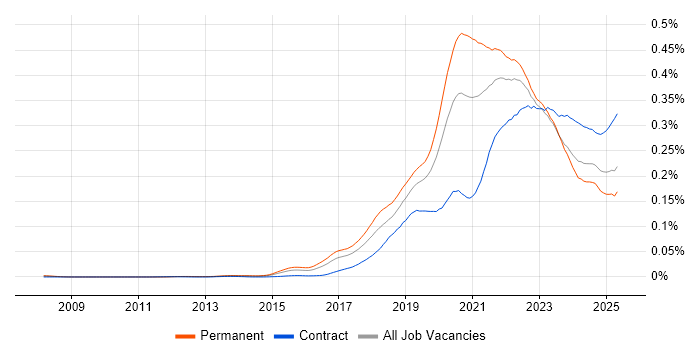Site Reliability Engineer (SRE)
UK
The median Site Reliability Engineer (SRE) salary in the UK is £69,384 per year, according to job vacancies posted during the 6 months leading to 31 May 2025.
The table below provides salary benchmarking and summary statistics, comparing them to the same period in the previous two years.
| 6 months to 31 May 2025 |
Same period 2024 | Same period 2023 | |
|---|---|---|---|
| Rank | 615 | 730 | 707 |
| Rank change year-on-year | +115 | -23 | -60 |
| Permanent jobs requiring a Site Reliability Engineer | 87 | 178 | 265 |
| As % of all permanent jobs advertised in the UK | 0.16% | 0.17% | 0.28% |
| As % of the Job Titles category | 0.17% | 0.18% | 0.30% |
| Number of salaries quoted | 65 | 164 | 227 |
| 10th Percentile | £57,500 | £55,375 | £42,874 |
| 25th Percentile | £63,630 | £67,500 | £57,500 |
| Median annual salary (50th Percentile) | £69,384 | £96,500 | £75,000 |
| Median % change year-on-year | -28.10% | +28.67% | -6.25% |
| 75th Percentile | £87,500 | £118,750 | £95,000 |
| 90th Percentile | £98,750 | £143,750 | £105,000 |
| UK excluding London median annual salary | £67,563 | £67,000 | £62,000 |
| % change year-on-year | +0.84% | +8.06% | -11.43% |
All Permanent IT Job Vacancies
UK
For comparison with the information above, the following table provides summary statistics for all permanent IT job vacancies. Most job vacancies include a discernible job title that can be normalized. As such, the figures in the second row provide an indication of the number of permanent jobs in our overall sample.
| Permanent vacancies in the UK with a recognized job title | 50,444 | 98,297 | 87,491 |
| % of permanent jobs with a recognized job title | 90.33% | 94.81% | 91.34% |
| Number of salaries quoted | 26,384 | 69,991 | 55,965 |
| 10th Percentile | £28,750 | £28,500 | £32,500 |
| 25th Percentile | £40,748 | £38,500 | £45,000 |
| Median annual salary (50th Percentile) | £55,000 | £52,500 | £60,000 |
| Median % change year-on-year | +4.76% | -12.50% | - |
| 75th Percentile | £73,750 | £70,000 | £80,000 |
| 90th Percentile | £95,000 | £90,000 | £100,000 |
| UK excluding London median annual salary | £51,000 | £50,000 | £53,500 |
| % change year-on-year | +2.00% | -6.54% | +6.49% |
Site Reliability Engineer
Job Vacancy Trend
Job postings that featured Site Reliability Engineer in the job title as a proportion of all IT jobs advertised.

Site Reliability Engineer
Salary Trend
3-month moving average salary quoted in jobs citing Site Reliability Engineer.
Site Reliability Engineer
Salary Histogram
Salary distribution for jobs citing Site Reliability Engineer over the 6 months to 31 May 2025.
Site Reliability Engineer
Top 16 Job Locations
The table below looks at the demand and provides a guide to the median salaries quoted in IT jobs citing Site Reliability Engineer within the UK over the 6 months to 31 May 2025. The 'Rank Change' column provides an indication of the change in demand within each location based on the same 6 month period last year.
| Location | Rank Change on Same Period Last Year |
Matching Permanent IT Job Ads |
Median Salary Past 6 Months |
Median Salary % Change on Same Period Last Year |
Live Jobs |
|---|---|---|---|---|---|
| England | +74 | 76 | £69,384 | -28.84% | 146 |
| UK excluding London | +185 | 47 | £67,563 | +0.84% | 57 |
| London | +15 | 40 | £85,000 | -20.93% | 89 |
| Work from Home | +64 | 35 | £72,500 | -17.14% | 88 |
| Midlands | +74 | 16 | £60,000 | +9.09% | 7 |
| West Midlands | - | 16 | £60,000 | - | 6 |
| North of England | +40 | 11 | £69,384 | -13.27% | 21 |
| Scotland | - | 9 | £65,000 | - | 2 |
| North West | +4 | 7 | £70,000 | -12.50% | 14 |
| South East | +67 | 4 | £75,000 | +7.14% | 11 |
| South West | +106 | 3 | £94,637 | +37.65% | 8 |
| North East | - | 3 | £69,384 | - | |
| East of England | +49 | 2 | - | - | 6 |
| Yorkshire | +53 | 1 | £70,000 | -12.50% | 7 |
| Wales | +40 | 1 | £67,626 | +22.96% | |
| Northern Ireland | - | 1 | £85,000 | - |
Site Reliability Engineer Skill Set
Top 30 Co-occurring Skills and Capabilities
For the 6 months to 31 May 2025, Site Reliability Engineer job roles required the following skills and capabilities in order of popularity. The figures indicate the absolute number co-occurrences and as a proportion of all permanent job ads featuring Site Reliability Engineer in the job title.
|
|
Site Reliability Engineer Skill Set
Co-occurring Skills and Capabilities by Category
The follow tables expand on the table above by listing co-occurrences grouped by category. The same employment type, locality and period is covered with up to 20 co-occurrences shown in each of the following categories:
|
|
||||||||||||||||||||||||||||||||||||||||||||||||||||||||||||||||||||||||||||||||||||||||||||||||||||||||||||
|
|
||||||||||||||||||||||||||||||||||||||||||||||||||||||||||||||||||||||||||||||||||||||||||||||||||||||||||||
|
|
||||||||||||||||||||||||||||||||||||||||||||||||||||||||||||||||||||||||||||||||||||||||||||||||||||||||||||
|
|
||||||||||||||||||||||||||||||||||||||||||||||||||||||||||||||||||||||||||||||||||||||||||||||||||||||||||||
|
|
||||||||||||||||||||||||||||||||||||||||||||||||||||||||||||||||||||||||||||||||||||||||||||||||||||||||||||
|
|
||||||||||||||||||||||||||||||||||||||||||||||||||||||||||||||||||||||||||||||||||||||||||||||||||||||||||||
|
|
||||||||||||||||||||||||||||||||||||||||||||||||||||||||||||||||||||||||||||||||||||||||||||||||||||||||||||
|
|
||||||||||||||||||||||||||||||||||||||||||||||||||||||||||||||||||||||||||||||||||||||||||||||||||||||||||||
|
|||||||||||||||||||||||||||||||||||||||||||||||||||||||||||||||||||||||||||||||||||||||||||||||||||||||||||||
